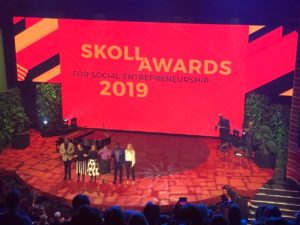By Web Communications
This blog post was written by Cali Livingstone (MBA’20).

Cali Livingstone
“Remember to continuously fall in love with the problem you are working on, and not the solution you have created for that problem.” These words echoed through the New Theater in Oxford, England earlier this month during a very impressive awards ceremony. They were shared by the two women founders of Harambee — a South African youth employment accelerator start-up — as they accepted their 2019 Skoll World Forum Award and the $1 million investment that comes with it.
The Skoll Foundation was established by e-Bay co-founder Jeff Skoll with the explicit goal of supporting social entrepreneurs who have built transformational solutions at scale to the world’s most pressing challenges. The awards are given out at an annual conference, the Skoll World Forum, hosted at SAID Business School in Oxford, England. The Skoll World Forum aims to convene entrepreneurs, non-governmental organization, corporations, investors, and media organizations to explore their roles in building a world where poverty, suffering, and injustice is obsolete — a world where humans can thrive. The Turner Family Center for Social Ventures is a long-time partner of Skoll’s; as the TFC Student Board Chair, I had the excellent fortune to be one of the 2,000 entrepreneurial change makers in attendance at the conference.
I came to business school at Owen from a career with Mercy Corps, a large international NGO, where I worked on programs that harnessed the power of the markets to transform how rural agrarian communities could access better farming inputs; more substantial buyer contracts; and improved incomes, education, healthcare, and lives. Attending Skoll felt like I had rejoined those who are the most dedicated to making our world a better place to live for everyone.
 The Annual Skoll Awards are the pinnacle of the conference. Four other equally inspiring start-ups stood alongside Harambee: mPharma, which provides innovative finance and inventory management services to reduce supply chain constraints for hospitals and pharmacies across five African countries; Crisis Text Line, which delivers 24-hour crisis prevention services via SMS text and is also amassing the largest data set on mental health in the history of the world; Thorn, which had developed a revolutionary AI-based software to assist police forces to pursue human and children sex traffickers; and mPedigree, which provides traceability and authentication to medicine and seed products in Africa, where four out of five pills sold are counterfeit.
The Annual Skoll Awards are the pinnacle of the conference. Four other equally inspiring start-ups stood alongside Harambee: mPharma, which provides innovative finance and inventory management services to reduce supply chain constraints for hospitals and pharmacies across five African countries; Crisis Text Line, which delivers 24-hour crisis prevention services via SMS text and is also amassing the largest data set on mental health in the history of the world; Thorn, which had developed a revolutionary AI-based software to assist police forces to pursue human and children sex traffickers; and mPedigree, which provides traceability and authentication to medicine and seed products in Africa, where four out of five pills sold are counterfeit.
Countless workshops, panels, speakers, and after-hours networking events emphasized the theme of the 2019 conference: Accelerating Possibility. Discussions centered on building cross-sector partnerships, conducting systems-level analysis and design, digging in to find root cause, and developing methods for deconstructing barriers to access. The passionate leaders who I interacted with shared their experience wrestling with many challenges: How can education be extended to the most vulnerable? How can technology be applied in a rural healthcare setting to transform diagnostics and care? How can subsistence farmers access critical market information to change their ability to negotiate on prices? What is the role of government in aiding this work? Can the power of corporates accelerate the reach of these big goals? These are questions that you can dedicate your life to and still not have an answer. Staying focused on the problems and not the solutions, the question and not the first answer you arrive at is essential in this work.
For me, the best part of attending the Skoll World Forum was the reminder that many wonderfully talented and deep thinkers are dedicating their lives to wrestle with these questions. And they will not give up in their pursuit of the iterations of answers it may take to establish a new status quo. After meeting so many new and inspiring people, forging friendships and even some nascent business partnerships, I headed back to Nashville to return to school. The questions, however, keep dancing in my mind and informing the work that I will continue to do at Owen, the TFC, and beyond.